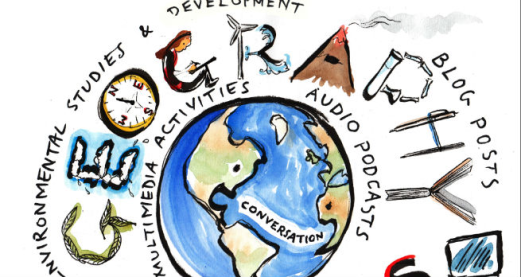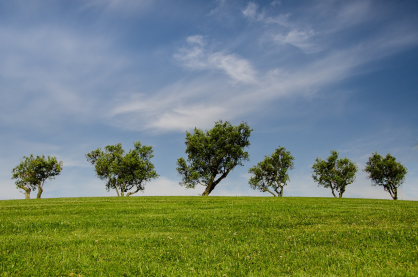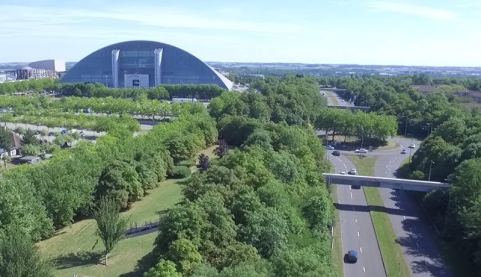
Press play to hear Joe’s thoughts, or read the transcript below.
Transcript
I’m Joe Smith, and for the last two years I’ve been one of a team of Open University environment researchers that have been working with a rare and precious resource. Our Earth in Vision project has allowed us to dive into an archive collection of a hundred environmental programmes from across fifty years of the BBC’s broadcasting about environmental issues.
In this two part podcast I invite you to join me on my own journey through the archive, stopping off to discuss a few of the programmes that stand out to me. I want to share some of our thoughts about how broadcasting has shaped how we think about environmental issues today.
We start our search in the archives in 1957. This is no coincidence: it was the launch of the International Geophysical Year. “Why haven’t you heard of the IGY?” asks Prince Philip, as he introduces the BBC’s coverage: “well, probably because peaceful cooperation is a bore” he went on. ‘The Restless Sphere’ was the title given to a documentary that outlined the most ambitious global scientific collaboration in history. In it the Duke of Edinburgh shows himself to be something of a TV natural. The show he fronts celebrates a year of experiments that mark the beginning of a global environmental science. The script emphasises the importance of technology in revealing this new view of the world. Philip talks excitedly about ‘the electronic eyes and ears of these rockets’, and he notes that ‘Since the beginning of time the world has never been seen as a planet.’ The IGY, and the broadcasting around it, set in train a new understanding of planet Earth as an integrated system, and also of threats to that system generated by humanity. But it’s perhaps more than a footnote that if you were the proverbial Martian watching this show you would think that only white middle-aged men in suits and ties enjoyed the power of speech.
These were of course also the people who commissioned and made television in the 1950s and 1960s. They had lived through both the Second World War and Britain’s last days as a colonial empire. Struggles for independence from British rule had been tense and in many cases bloody and that is the background that may go some way to explaining the editorial tone of ‘The Challenge of the 60s’. This film was introduced with footage, design and a script that taken today would be read by most of us as bluntly racist. The esteemed broadcaster, Richard Dimbleby, opens the show in ominous tones. He states that: “By 1960 the population of the world will be 600million larger than it is today and more than two thirds of the total population will then be coloured”. Well, Britain had enjoyed two hundred years of being a dominant global power that controlled massive flows of resources. As this power waned British audiences were invited to consider the relationship between scarce resources and population growth in an increasingly independent Africa. This documentary, ‘The Challenge of the 60s’, told me as much about how Britain’s elite felt threatened by its changing status in the world than it did about demographic change.
The BBC have regularly returned to the theme of population, resources and the future since, and in one episode of a 1967 series on The Population Problem a central casting Professor-type predicts that ‘in the future we’ll all be living underground eating minute floating plants’, and I should say that that’s his optimistic scenario.
But the lighthearted moments are few and far between in TV coverage of population. From the 1960s onwards, broadcasters tended to frame it as a current problem and future menacing threat. The archives show how collage techniques have long been used as a shorthand way of expressing the relationship between human numbers, consumption and environmental hazard.
Again and again you see montages of teeming city streets, aerial footage of skyscrapers and congested roads, and human ‘swarms’ are sometimes implied by intercut footage of insect swarms and mounds. Cue music with urgent beat. Cue portentous voiceover. And now to the expert in the studio to plug the message home. In short, it had taken just over a decade for the exhilarating ‘new view of the Earth from space’ portrayed in The Restless Sphere to turn into a dystopian vision of too many people eating up the planet, and broadcasting seems to have played a big role in that.
The themes running through these podcasts recur throughout the Open University’s interdisciplinary environment curriculum. You can find out more by visiting the Module pages.
Both of these podcasts are based on research funded by the UK’s Arts and Humanities Research Council. You can find more about the research here: http://earthinvision.org/ team on Twitter @EarthInVision
Or carry on to Joe's second podcast
-

Geography Matters: A Collection
Watch now to access more details of Geography Matters: A CollectionWant to find out more about Geography and Environmental Studies at The Open University?
-

Should Economics and the Environment work together?
Listen now to access more details of Should Economics and the Environment work together?The recent UK general election saw many parties pledge to ‘improve’ the environment. Vicky Johnson considers progress can be measured by more closely connecting the environment to economics.
-

How is Milton Keynes a ‘smart’ city?
Watch now to access more details of How is Milton Keynes a ‘smart’ city?What is a ‘smart city’, and how is smart rooted into Milton Keynes’ past and future?
-

‘Citizen sensing’ and new forms of environmental monitoring
Read now to access more details of ‘Citizen sensing’ and new forms of environmental monitoringWhat technological challenges are faced by communities seeking to understand environmental change at different geographical scales?
Rate and Review
Rate this audio
Review this audio
Log into OpenLearn to leave reviews and join in the conversation.
Audio reviews